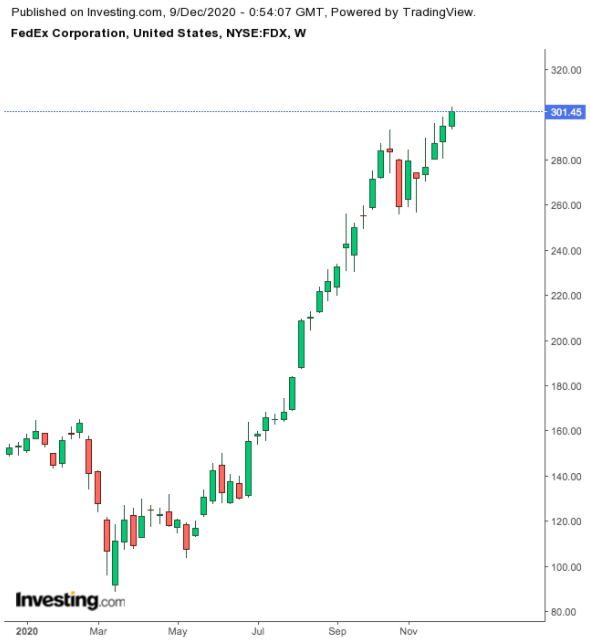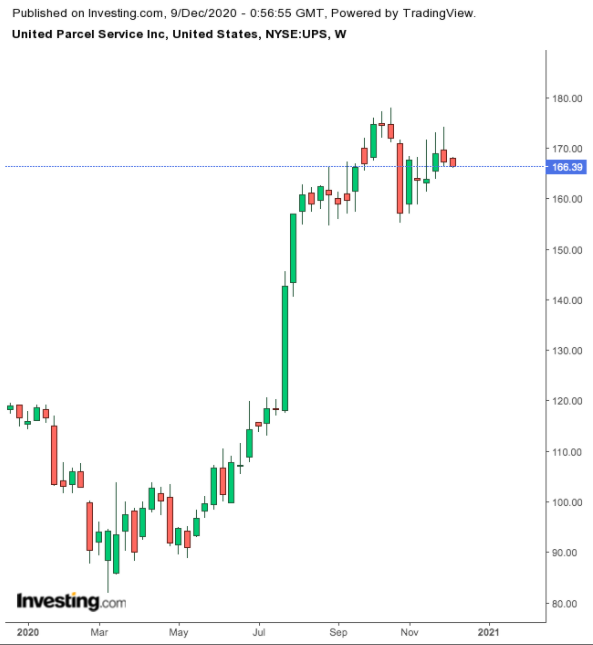E-commerce is booming during the pandemic and so are the companies that deliver shipments to millions of consumers stuck in their homes.
The demand for delivery services has been so strong this holiday season that United Parcel Service (NYSE:UPS) imposed shipping restrictions on some large retailers like Gap Inc (NYSE:GPS) and Nike (NYSE:NKE) last week, the Wall Street Journal reports.
This unexpected shift in consumer purchasing trends has already immensely benefited the parcel delivery rivals FedEx (NYSE:FDX) and UPS. Their shares, after fully recovering from the March dip, are up about 96% and 43% this year, respectively.
So, if you’re looking to add one of these players to your portfolio right now, you have to decide between these two competitors and their growth prospects. Let’s take a deeper look.
FedEx: Early Preparations Making The Difference
FedEx’s business restructuring—which was planned before the pandemic—proved to be a great differentiator in this new environment. Before COVID-19 spread across the globe, the company had already moved to seven-day service, expanded capacity for larger packages, introduced new routing software and began pushing more express packages into the lower-cost ground network.
The company’s latest quarterly earnings also showed it is well-prepared to take advantage of this new situation. In September, FedEx reported the highest adjusted operating margin for its fiscal first quarter since 2017.
Revenue climbed more than 13% to $19.3 billion, a quarterly record for the company, and earnings-per-share about doubled what analysts had been anticipating.
Said CEO Fred Smith:
“Our earnings growth underscores the importance of our business initiatives and investments over the last several years and, in many ways, the world has accelerated to meet our strategies.”
Before the pandemic, FedEx was struggling to win investors' confidence. The biggest concern keeping them on the sidelines was the ongoing trouble its European business faced after its costly takeover of Dutch courier service TNT in 2015. That deal failed to unlock the value investors were hoping to see.
The integration challenges and the slowing European economy had raised doubts about the benefits of the TNT deal, with some analysts questioning the wisdom behind this massive undertaking. But the global health crisis has changed the dynamics, giving management a window of opportunity to turn around the business.

With FedEx shares surging more than 30% in the past three months, analysts are getting more bullish. Indeed, 71% of them rating the stock a buy, according to FactSet. Barclays last week upgraded the stock to overweight from equal weight, citing “an abundance of growth opportunities” tied to the e-commerce expansion.
Shares of FedEx closed Tuesday at $301.45, up almost 1.5% on the day.
UPS: Facing Cost Pressures
In many ways, the story of UPS is no different. The company is ideally positioned to benefit from the e-commerce boom and perhaps better aligned with customers due to its strong ground operations.
But if you look at the company’s share performance over the past three months, it’s obvious that investors are favoring FedEx over UPS. The stocks diverged in early September, when FedEx continued its upward trajectory, while UPS underperformed.

UPS shares closed Tuesday at $166.39, down 0.64% on the day.
The main factor making investors nervous about UPS is the company’s escalating costs, which are eating up margins. Profit margins will be pressured again this quarter as the company increases expenses to handle peak-season volume.
Chief Executive Officer Carol Tome, who took the reins in June, told investors in October that they’ll have to wait until next year for profit margins to improve at the U.S. unit, where a surge in e-commerce deliveries is fuelling expenses.
In contrast, FedEx has been successful in keeping a check on costs with a mix of job cuts, reduced incentive compensation, aircraft retirements and delays on some planned investment projects.
These concerns have Wall Street divided over UPS’ potential, with 54% of analysts rating the stock a buy, 27% remaining neutral and 19% in the sell camp. Morgan Stanley analysts said last week that UPS is facing “competitive secular threats” that could erode its consumer-facing business.
Bottom Line
Both FedEx and UPS are benefiting from the surge in e-commerce deliveries in 2020 and there is strong evidence that this trend is here to stay. Overall, FedEx has been performing better as it is succeeding in keeping its costs under check even as the delivery volume grows. UPS, on the other hand, is struggling to cut costs and improve its margins.
